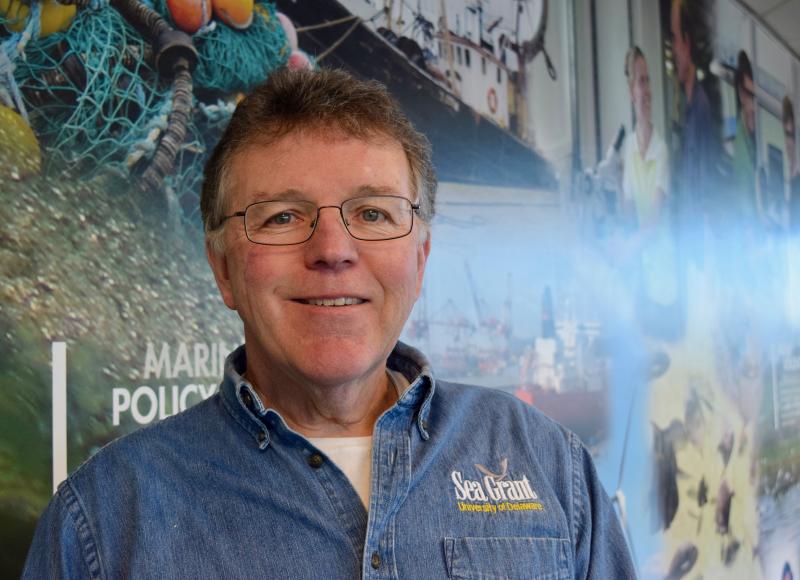Jim Falk: Slowing down after career along the coast
When Jim Falk arrived in Lewes in 1978, no one had yet studied why people were visiting the Cape Region or what they did when they got here.
The recent college grad was hired by the University of Delaware's Sea Grant College Program to find those answers. At the time, the state's tourism and recreational industry was just starting to hit its stride.
“Nobody had really ever done that in the local area until we started doing it through our Sea Grant Program and working with our surveys to find out what visitors really like about the area, what they did when they came here, where they came from and how you better market and reach those target populations,” he said. “I think we had a bit of a good run there.”
Falk's work, which he couldn't have done without partnerships with UD graduate students, local businesses, municipalities and chambers of commerce, has paved the way for more state and local buy-in to protect environmental assets through sustainable development, he said.
“The environment is the golden goose,” the outgoing Delaware Sea Grant acting director said. “That's what my whole career has been based on – trying to find that balance of protection, conservation of our natural resources as well as looking at how you can still have vibrant coastal communities.”
Through research projects, grants and partnerships, Falk worked with communities and residents to focus on sustainable coastal development and supporting the natural resources that drive the state’s thriving tourism industry.
“We don't come to communities and say we've got the solutions,” he said. “You've got the solutions within your community if you know how to engage the community in dialogue so that they come up with the solutions and the answers.”
Studying nature's impact on the state's tourism economy, and vice versa, has emphasized the importance of environmental stewardship among locals, visitors and those who live, work and play on Delaware's waterways.
Spending days along popular docks gave Falk an insight into Delaware's profitable recreational fishing community as he shifted his research focus to learning more about how people – especially boaters and fishermen – use natural resources. While it was sometimes a little difficult to get information from a fisherman returning from a full day with an empty cooler, Falk said, those face-to-face experiences with Sussex Countians taught him more about the area than any office-based research project could.
“You really found out a lot about people in general,” he said. “That was a really satisfying part of my career. You had the opportunity to talk to them about the importance of our natural resources and why we need to protect them, and hopefully you were having a dialogue that would instill some environmental stewardship within them.”
Growing up in a military family, Falk spent a lot of time in a lot of different places in the United States and Europe. When he took the job in Delaware, he said, his initial thought was he would gain experience for a few years before moving on to the next big thing.
“Before that, I don't think I had ever spent any time in Delaware, other than maybe going on I-95,” he said with a quiet laugh.
Thirty-eight years, four months and 15 days later, Falk sat in his small office on the University of Delaware's Lewes campus, and talked about the important role Delaware has played not only in his career, but his personal life as well.
“We don't do this for the money,” Falk said with a patient grin. “You do it for the passion and the people you work with. The satisfaction you get, it's not monetary. It's more in seeing the impact you have on people, and how you've maybe helped change their lives or their way of doing things for the better.”
As the calm 67-year-old scanned the spines of dozens of research projects lining the shelves of his simple bookcases, he lit up as he caught sight of a recent project chronicling the history of a beloved event: UD's popular Coast Day.
Disappointment briefly crosses his face as he talks about why Coast Day was put on hold in 2015 and 2016. But it will return this fall, and even though Falk has retired, he said he'll still participate in the coastal celebration that attracts about 10,000 people each year.
“There's an element of sadness that I'm leaving at a time we're bringing in a lot of new talent and ideas,” he said. “But then there's also a side of me that says – we've got a new president, we've got a new governor, we've got a new university president, we'll have a new dean– it's time for me to bail out, and let somebody new work with all these other new faces.”
The Rehoboth Beach resident officially retired Jan. 31, but said he'd be back in the building the next day to help students and volunteers rehearse for the regional Chesapeake Bay Bowl competition showcasing area high school students' knowledge of coastal science.
It's likely Falk will remain a familiar face around UD, when he's not enjoying his new-found freedom to spend more time with his family and 10-year-old son, James Jr., traveling, volunteering in the community and working on DIY projects around the house. Falk said he also plans to work on a book about his life as a legacy for his young son.
“I always wanted to write a book,” he said. “But I'm gonna miss it. I know that right up front.”
For more about Delaware Sea Grant, go to deseagrant.org.



























































